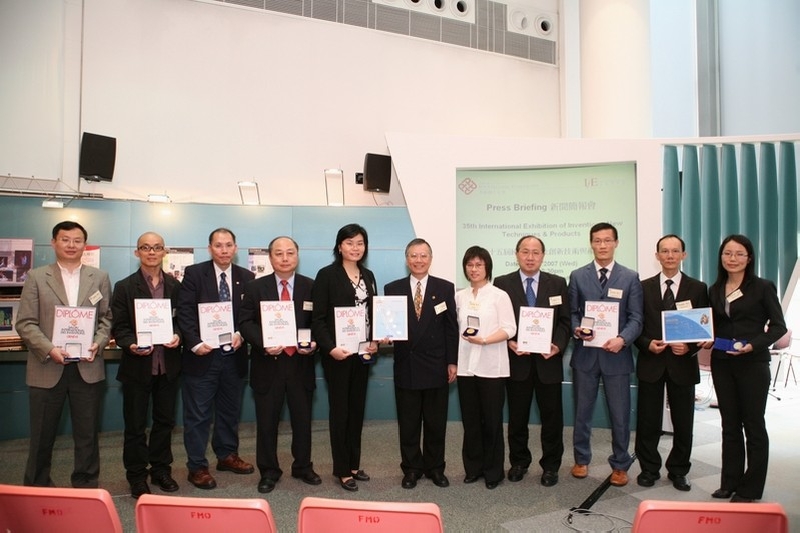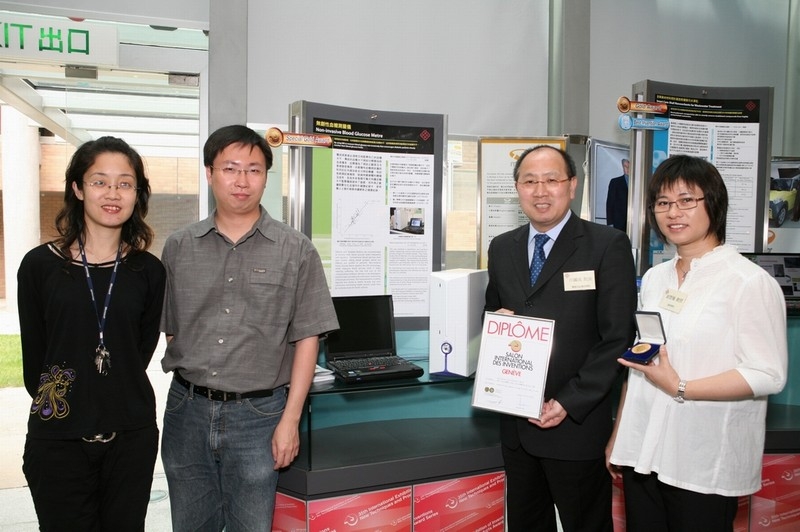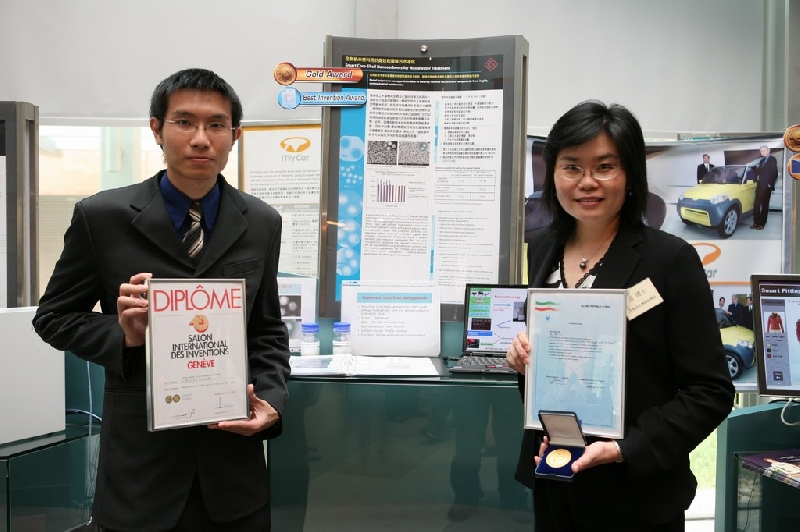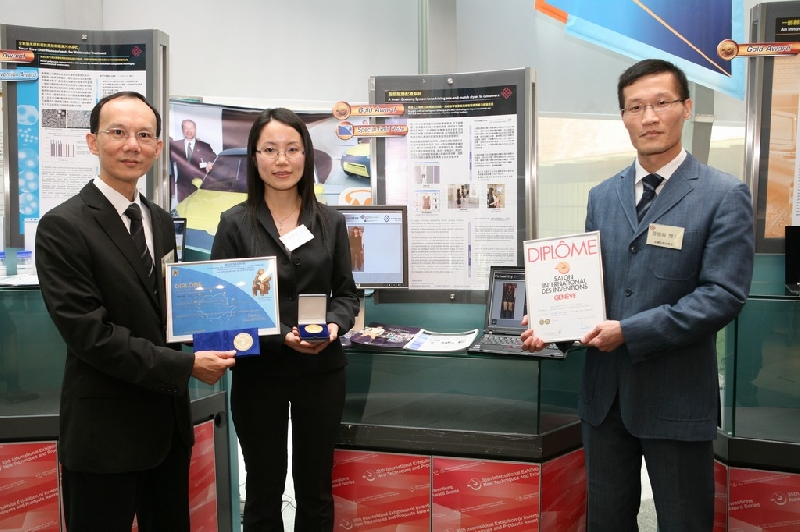The Hong Kong Polytechnic University (PolyU) has been awarded record number of awards in the International Exhibition of Inventions, New Techniques and Products held from 18 to 22 April in Geneva. This year PolyU won one Gold Medal with Jury’s Congratulations as well as three Gold, two Silver and one Bronze Medals plus two Special Prizes in this large-scale event.
It was also the fourth time that PolyU participated in this annual international event. Under the patronage of the Swiss Federal Government and the City Government of Geneva, the exhibition has put together some 1,000 inventions and 775 exhibitors from 45 countries, drawing more than 75,000 visitors from all over the world.
The winning entries presented by PolyU and their respective Principal Investigators are listed and briefly described as follows:
(1) Gold Medal with the Jury’s Congratulations : Non-invasive Blood Glucose Meter
Principal Investigator: Prof. Thomas Wong Kwok-shing, Dean of the Faculty of Health and Social Sciences
With the use of near-infrared technology, PolyU researchers have developed a novel method to monitor the blood glucose level of human subjects. Unlike traditional method of collecting blood samples through syringes, this new method is non-invasive and will not cause any pain or discomfort to the subjects. The new device works on the mechanism of identifying and reducing the number of essential wavelengths required. This can help to reduce the size and cost of corresponding hardware device and facilitate portable and continuous monitoring of blood glucose level. This method is ideal for diabetic patients who need to check their blood glucose level frequently. Its use can be further extended to the monitoring of other blood substrates such as cholesterol and lactic acid.
Led by Prof. Thomas Wong, the research team members also include Prof. Joanne Chung and Dr Fan Ka-lun of PolyU’s School of Nursing.
(2) Special Prize and Gold Medal : Smart Core-Shell Nanosorbents for Wastewater Treatment
Principal Investigator: Dr Pei Li, Associate Professor, Department of Applied Biology and Chemical Technology
Dr Li has developed a new type of polymer particles which have well-defined hydrophobic cores and functional hydrophilic shells. The sizes of these core-shell particles are in the range of nano- to submicro- scale. The functional shells of the particles can effectively absorb most of recalcitrant organic and inorganic contaminants which are frequently found in landfill leachate and industrial wastewater, The absorbed particles containing contaminants can be simply separated by using an ultra-filtration system, then easily regenerated for repeated uses without affecting their absorption capacity and removal performance for the targeted compounds. Compared to other low-cost adsorbents such as granular activated carbon (GAC), the core-shell nanoparticles have many benefits including large surface area and high reactivity for efficient absorption, short treatment time and ease of operation, good dispersion and rapid diffusion in water, capable of recycling for repeated uses, anti-virus and bacterial properties. Thus the use of such core-shell nanosorbents will certainly provide a new environmental nanotechnology for water pollution control.
(3) Special Prize and Gold Medal : A Smart Dressing System for advising mix-and-match styles to customers
Principal Investigators: Dr Calvin Wong Wai-keung, Assistant Professor; Dr Sunney Leung Yung-sun, Assistant Professor and Dr Tracy Mok Pik-yin, Lecturer, Institute of Textiles and Clothing
This innovative smart dressing system offers real-time mix-and-match style advices to customers when they view their selected fashion items in front of a dressing mirror or try them on inside a fitting room. It can also customizes the recommendations using specially developed programmes, including a virtual try-on simulator to fit the product image onto the body figure of the customer, an intelligent fashion mix-and-match engine for emulating fashion designers in mixing and matching fashion items, and an intelligent VIP engine for customizing mix-and-match suggestions to individual VIP based on his/her previous purchases. The system, enabled by Radio Frequency Identification (RFID) technology, has strong potential to assist fashion retailers to improve their overall services and link up with the backend operations.
The system is currently used by a large fashion retailer and being phased in for installation at its retail outlets in different districts. It is envisaged to help fashion retailers boost their business volumes by improving sales and customer services.
(4) Gold Medal : An Innovative Micro Injection Molding Machine
Principal Investigator: Prof. Yung Kai-leung, Associate Head, Department of Industrial and Systems Engineering
This is the world’s first bottom-up high precision plastic micro-injection moulding machine which can be used in the miniaturization of products and producing high precision micro plastic parts such as micro bio-mechanisms, micro-pumps, micro nozzle, medical parts, micro lenses and optical connectors. Plastic micro-injection moulding is the most cost-effective method of making high accuracy micro-features. Other machines only attempt to reduce the size of conventional designs while the PolyU-designed machine adopts a revolutionary upward injection design to eliminate the air entrapment problem and the need for shutoff
valves that restricts melt flow. There are four servos each at the four corners of the mould clamping to automatically adjust clamping pressure for minimum mould distortion. Two linear motors are used to propel the plastic into the mould, giving unmatched acceleration and precision well below milligram level. The precision is further enhanced by real-time pressure signature analysis to prevent any variations. The mechanical design is simple with mechatronic control for future performance optimization through software upgrades.
The state-of-the-art technology was developed at PolyU’s Microsystems Technology Centre, which was established in 2005 with a substantial funding from the Government’s Innovation and Technology Fund.
(5) Silver Medal : On-Screen Marking System
Principal Investigator: Prof. Stephen Mak, Department of Building and Real Estate
In this system, examination papers are scanned and displayed on screen for marking. Pen-based mark-ups, stamps and other marking notations for different subjects are available to facilitate the marking process, and marks are recorded automatically. The system allows teachers to mark examination papers, projects or assignments on a personal computer in stand-alone mode. This system is suitable for use by individual teachers in both small and large-sized schools as well as universities.
(6) Silver Medal : Clogfree Filter
Principal Investigator: Dr Michael Siu Kin-wai, Associate Professor, School of Design
A common problem with filters is that the inlets of their filtration passages are often clogged by various substances during the filtration process. To enhance the filtration process, this invention minimizes clogging by adding canals to each inlet of the filtration passage so that unwanted substances will be blocked, while allowing finer fluids and substances to pass through. This creative concept is a breakthrough in designing filtration passage inlets, and it can be applied to most types of filters and filtration systems, in particular water filter systems. Since 2005, in collaboration with MIT, Stanford University, World Bank, Environment and Public Health Organization, Japan Red Cross Society, Nepal Red Cross Society, US Peace Corps, and some other international institutes and NGOs, the researcher has applied the "Clogfree" concept in the design of the KanchanTM Arsenic Filter (KAF) for removing contaminants, in particular arsenic, in drinking water. The invention is planned to be implemented in the KAF, which will be delivered to the rural communities in third world countries such as Nepal, Cambodia and Bangladesh.
(7) Bronze Medal : Personalized Ventilation Device Integrated with Seats
Principal Investigator: Dr Niu Jianlei, Associate Professor, Department of Building Services Engineering
In air conditioned spaces, ventilation air is usually distributed via overhead high-velocity air diffusers and nozzles. Most of the existing air-supply devices are ineffective in reducing the risks of air-borne infectious disease transmission from person to person and indoor occupant and air traveller’s exposure to air pollutants, as evident in the SARS outbreak in 2003. The new air supply device developed by Dr Niu consists of a flexible air supply nozzle integrated
with an individual seat, adjustable to suit the user’s body position. The inhaled air will be 80 per cent less polluted than the surrounding air, thus reducing the respiratory intake of air pollutant and the risk of catching airborne infectious diseases. The device can be applied for seats in settings such as auditoriums, cinemas, aircrafts, train compartments and buses.
For more details about the International Exhibition of Inventions, please refer to its official website at URL: www.inventions-geneva.ch
*****



